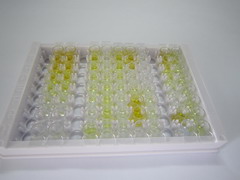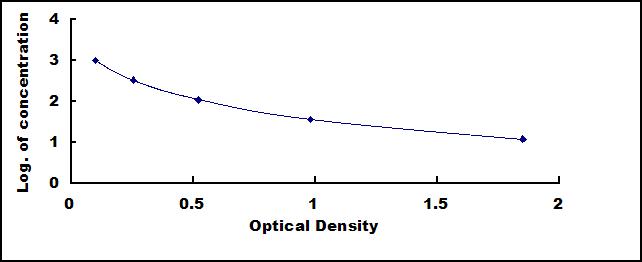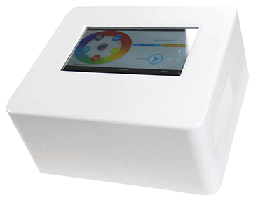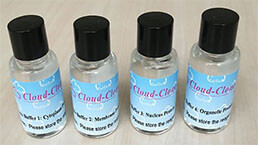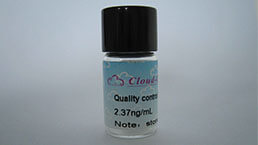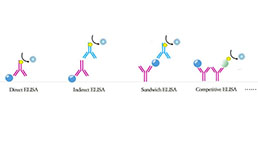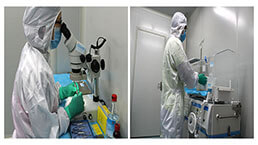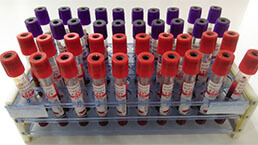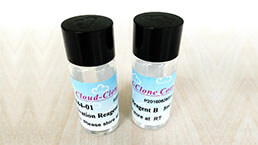Packages (Simulation)

Reagent Preparation

Image (I)
Image (II)
Certificate


ELISA Kit for Corticotropin Releasing Factor (CRF)
CRH; Corticotropin Releasing Hormone; Corticoliberin
- Product No.CEA835Hu
- Organism SpeciesHomo sapiens (Human) Same name, Different species.
- Sample Typeserum, plasma and other biological fluids
- Test MethodCompetitive Inhibition
- Assay Length2h
- Detection Range12.35-1,000pg/mL
- SensitivityThe minimum detectable dose of this kit is typically less than 5.05pg/mL.
- DownloadInstruction Manual
- UOM 48T96T 96T*5 96T*10 96T*100
- FOB
US$ 441
US$ 630
US$ 2835
US$ 5355
US$ 44100
For more details, please contact local distributors!
Specificity
This assay has high sensitivity and excellent specificity for detection of Corticotropin Releasing Factor (CRF).
No significant cross-reactivity or interference between Corticotropin Releasing Factor (CRF) and analogues was observed.
Recovery
Matrices listed below were spiked with certain level of recombinant Corticotropin Releasing Factor (CRF) and the recovery rates were calculated by comparing the measured value to the expected amount of Corticotropin Releasing Factor (CRF) in samples.
| Matrix | Recovery range (%) | Average(%) |
| serum(n=5) | 85-93 | 89 |
| EDTA plasma(n=5) | 91-101 | 95 |
| heparin plasma(n=5) | 93-101 | 97 |
Precision
Intra-assay Precision (Precision within an assay): 3 samples with low, middle and high level Corticotropin Releasing Factor (CRF) were tested 20 times on one plate, respectively.
Inter-assay Precision (Precision between assays): 3 samples with low, middle and high level Corticotropin Releasing Factor (CRF) were tested on 3 different plates, 8 replicates in each plate.
CV(%) = SD/meanX100
Intra-Assay: CV<10%
Inter-Assay: CV<12%
Linearity
The linearity of the kit was assayed by testing samples spiked with appropriate concentration of Corticotropin Releasing Factor (CRF) and their serial dilutions. The results were demonstrated by the percentage of calculated concentration to the expected.
| Sample | 1:2 | 1:4 | 1:8 | 1:16 |
| serum(n=5) | 86-101% | 78-102% | 83-99% | 97-104% |
| EDTA plasma(n=5) | 83-101% | 80-105% | 90-98% | 80-93% |
| heparin plasma(n=5) | 78-92% | 94-101% | 85-99% | 97-105% |
Stability
The stability of kit is determined by the loss rate of activity. The loss rate of this kit is less than 5% within the expiration date under appropriate storage condition.
To minimize extra influence on the performance, operation procedures and lab conditions, especially room temperature, air humidity, incubator temperature should be strictly controlled. It is also strongly suggested that the whole assay is performed by the same operator from the beginning to the end.
Reagents and materials provided
| Reagents | Quantity | Reagents | Quantity |
| Pre-coated, ready to use 96-well strip plate | 1 | Plate sealer for 96 wells | 4 |
| Standard | 2 | Standard Diluent | 1×20mL |
| Detection Reagent A | 1×120µL | Assay Diluent A | 1×12mL |
| Detection Reagent B | 1×120µL | Assay Diluent B | 1×12mL |
| TMB Substrate | 1×9mL | Stop Solution | 1×6mL |
| Wash Buffer (30 × concentrate) | 1×20mL | Instruction manual | 1 |
Assay procedure summary
1. Prepare all reagents, samples and standards;
2. Add 50µL standard or sample to each well.
And then add 50µL prepared Detection Reagent A immediately.
Shake and mix. Incubate 1 hour at 37°C;
3. Aspirate and wash 3 times;
4. Add 100µL prepared Detection Reagent B. Incubate 30 minutes at 37°C;
5. Aspirate and wash 5 times;
6. Add 90µL Substrate Solution. Incubate 10-20 minutes at 37°C;
7. Add 50µL Stop Solution. Read at 450 nm immediately.
GIVEAWAYS
INCREMENT SERVICES
| Magazine | Citations |
| Toxicology Letters | Regulation of corticosterone secretion is modified by PFOS exposure at different levels of the hypothalamic–pituitary–adrenal axis in adult male rats Pubmed:24440345 |
| Bipolar?Disord. | Immune dysfunction in bipolar disorder and suicide risk: is there an association between peripheral corticotropin‐releasing hormone and interleukin‐1β? Pubmed:24862833 |
| Peptides | Differential stress response in rats subjected to chronic mild stress is accompanied by changes in CRH-family gene expression at the pituitary level Pubmed:25236411 |
| Ann Dermatol | Acute Stress-Induced Changes in Follicular Dermal Papilla Cells and Mobilization of Mast Cells:Implications for Hair Growth. pubmed:27746640 |
| Neuroscience | Heat stress-induced neuroinflammation and aberration in monoamine levels in hypothalamus are associated with temperature dysregulation pubmed:28663093 |
| Biomed Research International | Colonic Transit Time and Gut Peptides in Adult Patients with Slow and Normal Colonic Transit Constipation pubmed:29082242 |
| Biochemical Pharmacology | Effects of n-3 PUFA enriched and n-3 PUFA deficient diets in naïve and Aβ-treated female rats Pubmed:30028991 |
| Frontiers in Pharmacology | Vaccinium bracteatum Leaf Extract Reverses Chronic Restraint Stress-Induced Depression-Like Behavior in Mice: Regulation of Hypothalamic-Pituitary … Pubmed:30038568 |
| Toxicology Letters | Perfluorooctane sulfonate (PFOS) can alter the hypothalamic-pituitary-adrenal (HPA) axis activity by modifying CRF1 and glucocorticoid receptors Pubmed:29807116 |
| Neuropsychiatric disease and treatment | The depressive-like behaviors of chronic unpredictable mild stress-treated mice, ameliorated by Tibetan medicine Zuotai: involvement in the hypothalamic … Pubmed:29379286 |
| BMC Veterinary Research | Hypothalamus-pituitary-adrenal axis involves in anti-viral ability through regulation of immune response in piglets infected by highly pathogenic porcine … Pubmed:29540178 |
| Bioscience Research | Bioscience Research |
| FASEB Journal | Contribution of DNA methylation in chronic stress–induced cardiac remodeling and arrhythmias in mice Pubmed: 31431066 |
| Aging Cell | Altered glucocorticoid metabolism represents a feature of macroph‐aging Pubmed: 32463582 |
| Endocr J | Impairment of CRH in the intestinal mucosal epithelial barrier of pregnant Bama miniature pig induced by restraint stress 33408312 |
| CRYOBIOLOGY | O-GlcNAc/Akt pathway regulates glucose metabolism and reduces apoptosis in liver of piglets with acute cold stress 33651993 |

